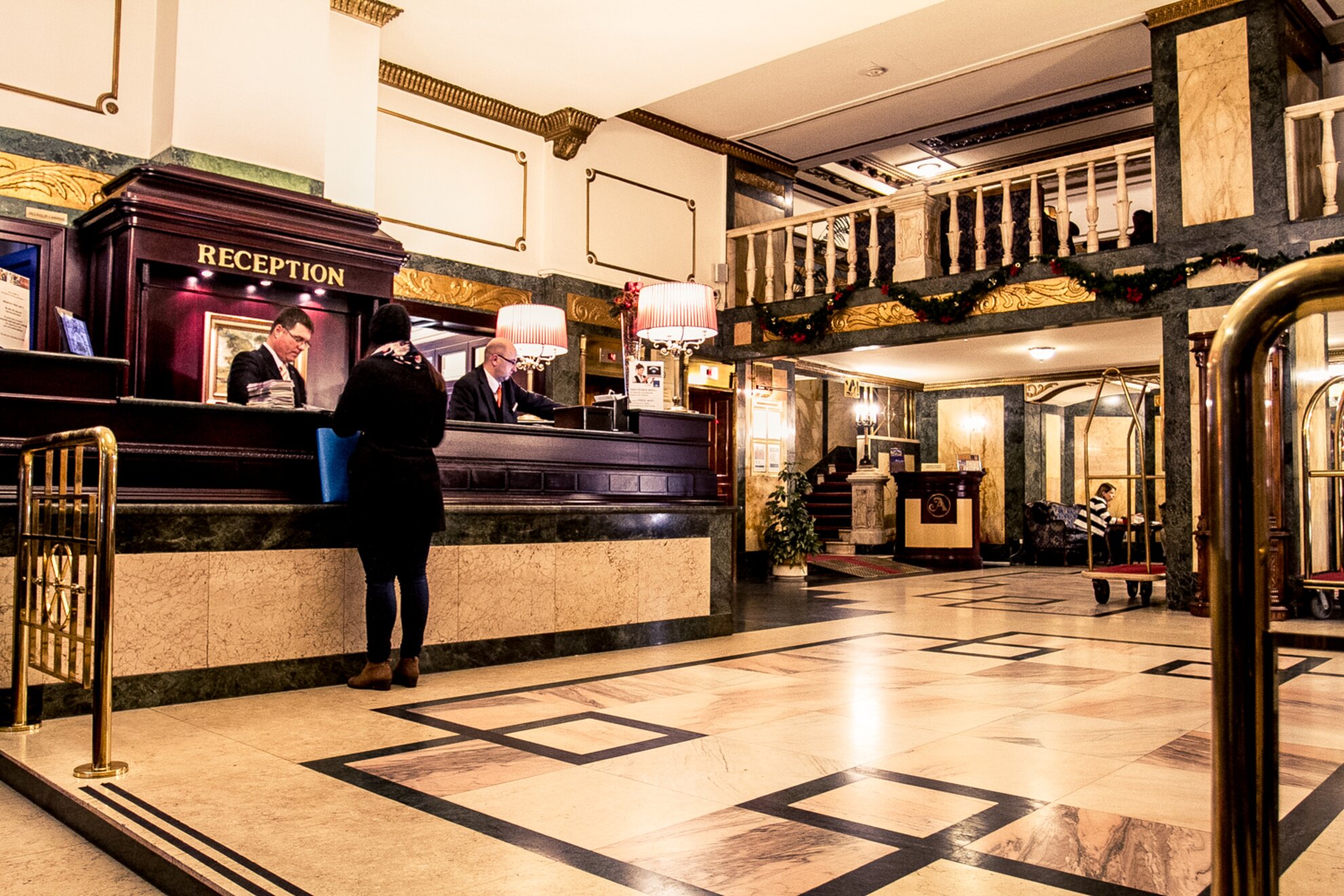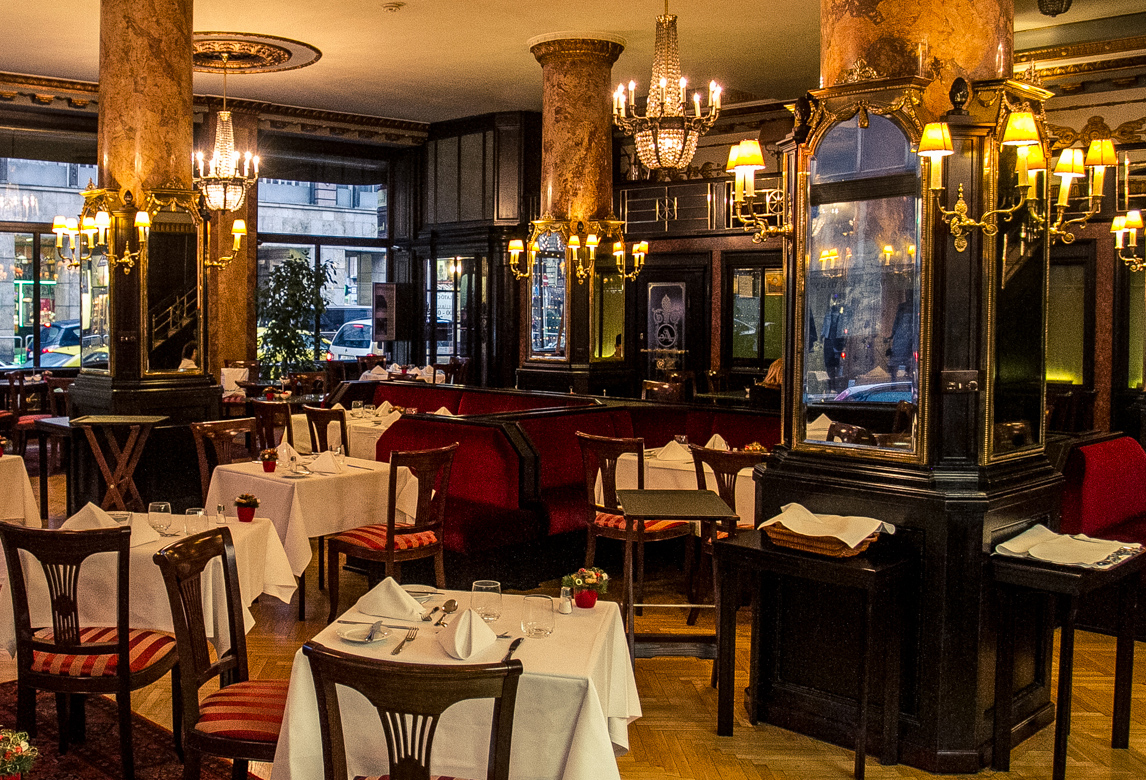When the Astoria opened in spring of 1914 under the leadership of General Manager Mihály Gellér (who had previously worked at the original location of New York’s legendary Waldorf Astoria, bringing his expertise and former employer’s name with him), this grand Budapest hotel was a state-of-the-art facility with then-impressive features like electric elevators and a central vacuum-cleaning system. While the Astoria was never intended to be a luxury hotel, the charming interior was sumptuously decorated with stained-glass windows, Sèvres vases, polished wainscoting, and fancy carpets – and many of these features still proudly adorn the hotel 100 years later.

Unfortunately, World War I began just months after the Astoria’s debut, doing a great deal of damage to the hotel’s business and infrastructure; in spite of this, when the country officially gained independence from the defeated Austro-Hungarian empire, the newly liberated Magyar leaders held their first meetings here in 1918. The 1930s brought about the Astoria’s heyday, but tragedy struck again when World War II broke out and German Gestapo officers commandeered the hotel as their residence; soon afterwards it was devastated by the invading Red Army. Nevertheless, the Astoria was one of the nation’s first hotels to reopen in the post-war period, and here guests are ceaselessly welcomed ever since then, while a series of renovations kept the hotel’s services up-to-date while preserving its time-honored features.

Now welcoming visitors with 135 air-conditioned rooms, three spacious suites, and diverse event facilities, this four-star urban palace is an especially central spot for business and leisure travelers alike, sited at a major downtown transport junction for buses, trams, and the aptly named Astoria M2 metro stop. Along with the accommodations and a shop for souvenirs and jewelry, the hotel’s Café Astoria encourages everyone to dine amid a setting of gleaming mirrors, marble columns, and plush booth seating – a serene scene hardly changed over the past century, providing a peaceful oasis to relax in while observing bustling city life through huge picture windows. Looking into this regal setting from the outside, it seems as though we are admiring a living photo from Budapest’s belle-époque era, and we are eager to experience this antiquity enhanced with modern-day conveniences.

Stepping into the lobby from the busy sidewalk feels like leaving modern times to enter a bygone mode of casually refined living – we leave traffic and troubles behind as the friendly desk clerk greets us at the stately reception desk. Check-in takes just a few moments, as we admire the museum-quality artifacts of the Astoria’s storied past intermingled with antique furnishings that perfectly complement the original copper fixtures and lead-glass windows. We are snapped back to the present when handed our contemporary key cards, and after being acquainted with the nearby attractions (the National Museum, Great Synagogue, and Váci Street are all just a few steps away from the Astoria), we head upstairs to our junior suite.

With its high ceilings and spacious floor plan, these corner lodgings are inviting and comfy – aside from occasional signs of wear like a bit of chipped paint here and there, the Astoria’s accommodations are thoroughly modern while bearing the dignity of yesteryear. After checking out the suite’s business desk with speedy Internet connections, the minibar (stocked with Hungary’s iconic Unicum bitters), and soft armchairs all amid tranquil silence, we are somewhat shocked by the blast of sound that results from opening the doors to our slender balcony – traffic whizzes by on the street below, yet we heard almost nothing through the soundproof windows.

Returning downstairs to the Café Astoria, we stroll through the splendid dining area quite similar to Budapest’s classic fin-de-siècle coffeehouses like Gerbeaud and Centrál, and take a seat near the window to enjoy people-watching over dinner. Along with a complete breakfast assortment, the menu here showcases haute-cuisine versions of classic Hungarian dishes (although visitors are welcome to simply stop in for a drink, snacks, or afternoon tea), and after perusing the seasonal selection we choose the savory saddle of venison with fried pasta, hollandaise with tarragon, and baby pears with vanilla – a hearty entrée served with contemporary artistic presentation.

Back in our suite, we freshen up in the modern bathroom with a bidet, broad marble-lined sink, and a powerful shower with a bathtub, providing just the steamy soak we need to loosen our muscles as we prepare to head to bed. Before retiring we stop to gaze at the ever-moving urban scenery outside; from the balcony we can see all the way to Keleti Station far to the east and the Danube riverfront to the west. Closing the doors to snuggle into the king-size bed, we delight in its soft coziness before falling soundly asleep, never once disturbed by the city life surrounding us.

In the morning we head back downstairs to breakfast, and are happily surprised to discover a magnificent spread – the sprawling buffet includes multiple fruit juices, scrambled eggs, croissants, salads, cheeses, baked beans, French toast, stewed vegetables, steak potatoes, diverse breads, and much more – including Hungarian specialties like lecsó pepper stew and Dobos Torte. As classical music scores the multilingual conversations of various guests sitting around the Astoria’s grand ballroom where the morning meal is served, it is easy to imagine that we have awoken back in an era when life moved at a slower pace, and everyday pleasures like breakfast were an occasion to luxuriate in; we certainly do so this morning.

But alas, the modern world awaited us back at We Love Budapest headquarters, and so after packing up our things we check out – but even this procedure brings about pleasant sensations of yesteryear, as we notice room rates are quite reasonable for the all-enveloping time-traveling experience of superb hospitality that the Astoria provides, particularly considering its super-central location. Many bland modern hotels could learn a lot from the Astoria’s iconic dedication to timelessly high-caliber service and style, which is surely the reason why this one-of-a-kind locale lives on with polished panache after more than a century.As of press time, room rates at the Danubius Hotel Astoria City Center for single-person occupancy range from approximately 70 euros per night to 120 euros per night, breakfast not included; see the hotel's room-reservations webpage for current rates.
We Love Budapest's "Guest Experience" series profiles various Budapest hotels that invite our staff to visit at no charge, but with the understanding that we may include negative impressions in our coverage; hotel management is not allowed to review these articles before they are posted.




